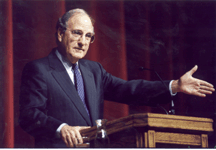Peace broker talks about war
When former Senator George Mitchell visited campus, he told listeners that much was buried in the rubble of the Sept. 11 attacks.
Peace broker talks about war
When former Senator George Mitchell visited campus, he told listeners that much was buried in the rubble of the Sept. 11 attacks.
 Sometimes it takes force to make peace, former Senator and international peacemaker George Mitchell told a full Ed Landreth Auditorium Oct. 3.
Sometimes it takes force to make peace, former Senator and international peacemaker George Mitchell told a full Ed Landreth Auditorium Oct. 3.
“No matter what we do, there will be more attacks,” he said. “So we must be aggressive and seek out the terrorists and disrupt their plans. The failure to do so would be evidence, even in the eyes of the terrorists, of America’s moral and physical weakness.
“But that does not mean anything goes. Our efforts must include focused military action, even as a broad coalition of support is maintained.”
Here as the fourth Fogelson Honors Forum speaker, Mitchell’s remarks were a salve to many worried listeners who were still reeling from the Sept. 11 attacks.
As the author of the Mitchell Plan, a report presented in April designed to end the Palestinian and Israeli conflict, and as a leader in peacemaking efforts in Northern Ireland, Mitchell spoke from experience.
“When the World Trade Center collapsed on Sept. 11, many died. So did many illusions. Such as America’s sense of invulnerability, safety and optimism,” he said. “We thought this couldn’t happen to us.”
As Mitchell reiterated the need for a global coalition, he said, “The notion of America going it alone is also buried in the World Trade Center.”
There are times the use of force is necessary to protect individual liberty and justice, he said.
“The making of peace is a long, slow and difficult process,” he said. “But patience is precisely what will be needed.”
“Still,” he added, “there is no such thing as a conflict that can’t be ended. No matter how hopeless it might seem, I believe peace and justice can be obtained.”

Your comments are welcome
Comments
Related Reading:
Campus News: Alma Matters
From Application to Admission
Amid an increasingly selective admission process, Heath Einstein leads the team that builds the TCU community of the future.
Campus News: Alma Matters
From the Chancellor
Chancellor Victor J. Boschini, Jr., identifies what made TCU and its sesquicentennial so memorable.